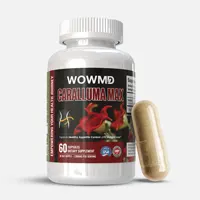How Melatonin Affects Dreams: Nightmares & Solutions
Find out here how melatonin affects dreaming and get tips to adjust your dosage for optimal sleep.
Advertiser Disclosure: WOWMD independently vets all recommended products. If you purchase a featured product, we may be compensated. Learn why you can trust us.
You May Also Like
Popular Stories
- Superfood Greens Powder Uses & Recipes
- The Best Beef Tallow Products for Radiant Skin: A 2026 Guide
- Holy Basil : Ayurveda’s Herb for Balance, Immunity & Everyday Calm
- Best Gel Moisturizers for Hydration & Skin Care in 2026
- 7 Best Effective Supplements for Improving Bladder and Prostate Health in 2026
- 4 Best Cooling Gels for Skin and Body: Instant Refreshment and Relief
References
WOWMD follows strict sourcing guidelines to ensure the accuracy of its content, outlined in our editorial policy. We use only trustworthy sources, including peer-reviewed studies, qualified experts, and information from top institutions.
- Melatonin, the Hormone of Darkness: From Sleep Promotion to Ebola Treatment - https://www.ncbi.nlm.nih.gov/pmc/articles/PMC4334454/
- Melatonin - https://my.clevelandclinic.org/health/articles/23411-melatonin
- Sleep Physiology - https://www.ncbi.nlm.nih.gov/books/NBK19956/
- Melatonin in Patients with Reduced REM Sleep Duration: Two Randomized Controlled Trials - https://academic.oup.com/jcem/article/89/1/128/2840303
- Melatonin - https://www.drugs.com/melatonin.html
- Meta-Analysis: Melatonin for the Treatment of Primary Sleep Disorders - https://pmc.ncbi.nlm.nih.gov/articles/PMC3656905/
- Melatonin-Responsive Complex Nocturnal Visual Hallucinations- https://pmc.ncbi.nlm.nih.gov/articles/PMC5886448/
 Alpha Man Power Pack
Alpha Man Power Pack All-Day Fat Burn Trio
All-Day Fat Burn Trio Better Immunity Bundle
Better Immunity Bundle  Calm & Sleep Duo
Calm & Sleep Duo Cognitive Health & Vision Combo
Cognitive Health & Vision Combo Complete Weight Loss Bundle
Complete Weight Loss Bundle Core Vitality Trio
Core Vitality Trio Energy Booster Combo
Energy Booster Combo Focus Fuel Trio
Focus Fuel Trio Glow & Balance Duo
Glow & Balance Duo Health Balance Trio
Health Balance Trio Heart Care Bundle
Heart Care Bundle Joint Health Support Combo
Joint Health Support Combo Men's Immunity & Prostate Health Bundle
Men's Immunity & Prostate Health Bundle Metabolism Boost Duo
Metabolism Boost Duo Natural Skin Care Bundle
Natural Skin Care Bundle Peak Performance Duo
Peak Performance Duo Relax & Recharge Duo
Relax & Recharge Duo Skin Detoxification Bundle
Skin Detoxification Bundle Smart Energy Trio
Smart Energy Trio Stress + Energy + Wellness Combo
Stress + Energy + Wellness Combo  Total Burn Ignite Trio
Total Burn Ignite Trio Total Harmony Pack
Total Harmony Pack Workout Supplements Combo
Workout Supplements Combo





































